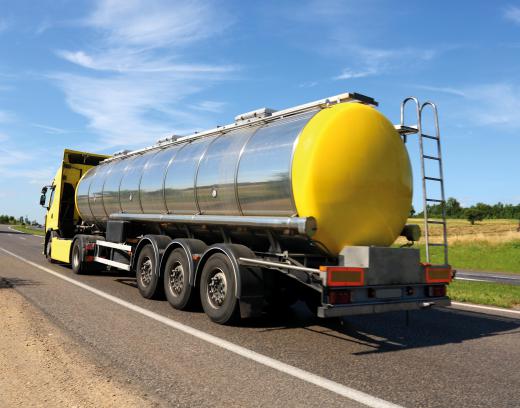Bulk trucking is a type of truck-based shipping service that moves bulk materials from one location to another by road. Any freight is considered bulk freight if the items are not packaged, and generally sold by weight or volume rather than individual pieces. Bulk trucking is often used to transport liquids, such as gasoline, or solids, such as grain. The equipment used to transport these materials can be very specialized, causing some bulk carriers to specialize in the transportation of certain materials.
The main job of a bulk trucking service is usually to take the transported materials from a production or storage area, such as a grain elevator, to a processing facility. Once there, the truck may then take the finished product to another distribution facility where it will eventually be sold to an end user, or it may go out via a more traditional trucking service after being packaged for retail.

In many cases, the difference between the equipment needed for bulk trucking versus regular trucking is significant. Trucks handling bulk materials must make sure it is completely sealed because the materials are not packaged. These loose materials could be lost very quickly in a traditional semi trailer. Therefore, the trailers used in bulk transportation are more expensive, and usually made out of steel, possibly with a lining inside depending on what is to be transported.

Loading materials in a truck used for bulk materials is usually done differently than with a traditional truck, especially if the product is liquid. These often have to be protected from the outside elements and therefore are loaded in completely enclosed containers using hoses and valves to control the flow. Grain may be loaded from the top after a truck has driven into a loading area located directly below where the grain will be dropped from.
Bulk trucking companies usually charge by the mile. Thus, longer hauls generally get charged greater rates than shorter hauls, as it is a more expensive job. Weight and materials may also play a role in the quoted price as well. Bulk trucking companies that can handle hazardous materials, for example, may charge a premium for such services because of the inherent risks involved, and the special precautions required.
Though bulk trucking companies are often specialized in what they do, they still must meet all the regulations any other trucking company must meet. This applies to proper placarding of hazardous materials, weight limits, and driver hour limits. Often, these things may be more important for bulk transportation services, as cleanup from accidents can be more difficult and expensive with goods that are not packaged.
